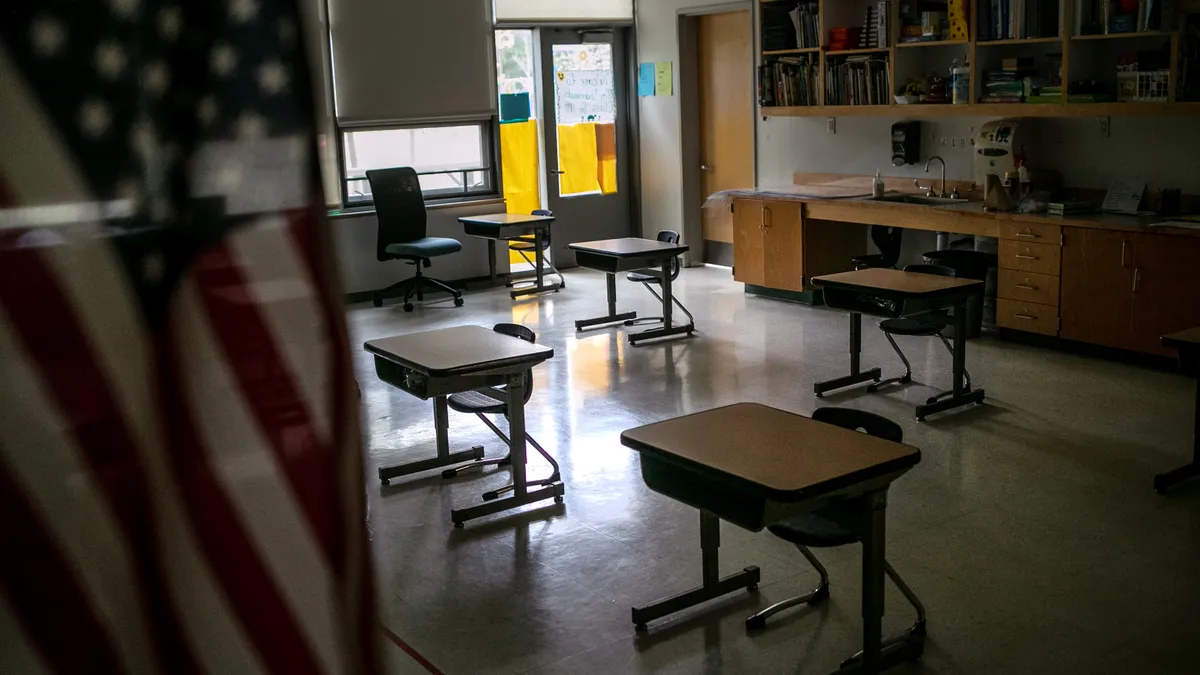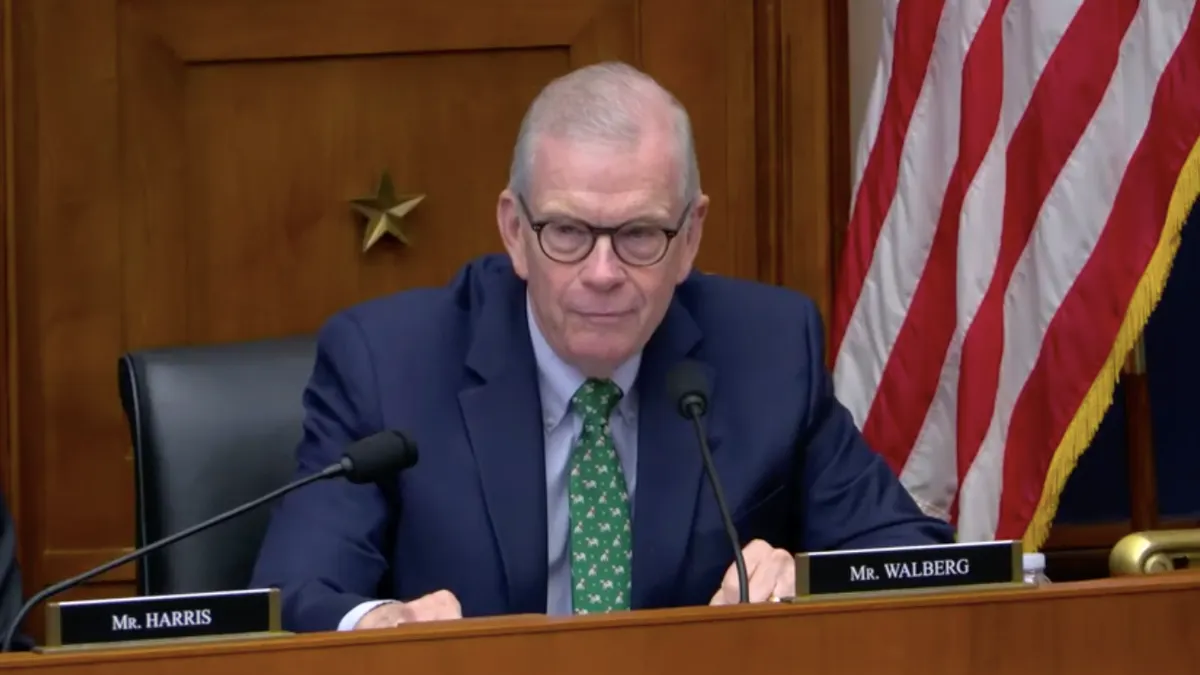The Michigan Department of Education gave school districts pandemic-era guidance that was inconsistent with Section 504 rules and "exacerbated and contributed to the harm to students with disabilities," according to the U.S. Department of Education's Office for Civil Rights.
In a 25-page notice of an "opportunity for a hearing" sent to Michigan's assistant attorney general last month, OCR said the state violated Section 504 of the Rehabilitation Act of 1973, the federal civil rights law that protects people against disability discrimination. OCR charged Michigan had improperly limited compensatory services to make up for lost instructional time during the pandemic for students across the state, including students attending the Michigan School for the Deaf.
Compensatory services are additional services offered as a nonlegal remedy to make up for missed or delayed evaluations or services because of anything from a hurricane to a child's illness to district errors. Pandemic-related school closures created conditions ripe for the need of compensatory services for some students.
According to OCR's May 23 notice, the information that the Michigan Department of Education provided to districts about compensatory services for students with disabilities who have individualized education programs "was inconsistent with the requirements of Section 504 and its implementing regulations."
Students at the Michigan School for the Deaf experienced a 43% reduction in instructional time during the 2019-20 and 2020-21 school years, according to OCR, which began its investigation into MDE in June 2022. The Michigan School for the Deaf is operated by MDE.
Additionally, the Michigan School for the Deaf failed to provide speech and language services from at least January 2021 to May 2, 2022, to 29 students whose IEPs promised speech and language services. OCR attributed the lack of these services to the school no longer having a speech and language pathologist.
The school has still not remedied its failure to provide compensatory services for the school's students who missed instruction during COVID-19 school closures, OCR said.
MDE also has not yet corrected or clarified its statewide pandemic-related guidance that is inconsistent with Section 504, according to OCR's notice. OCR first notified the state of its findings of noncompliance in June 2023.
"We will be responding to the allegations of OCR. We do not agree with them."

Michael Rice
Michigan state superintendent of public instruction
Typically states and districts will create an agreement with OCR to remedy wrongdoings discovered during an investigation. However, OCR said Michigan has "refused to enter into a resolution agreement and has failed to achieve compliance by voluntary means."
OCR originally gave MDE 20 days for the date of the notice — or until Wednesday, June 12 — to request a hearing to defend its practices. But that deadline was extended to July 2, according to the Michigan Department of Education.
A U.S. Education Department spokesperson said OCR does not discuss details of current cases.
If MDE doesn't respond to the notice, OCR could suspend or terminate federal finance assistance to the state until it has corrected its alleged noncompliance. OCR could also refer the case to the U.S. Department of Justice.
In a statement emailed to K-12 Dive on June 5, MDE wrote, "The Michigan Department of Education is strongly committed to providing equal access to educational opportunities to all students in Michigan – including students with disabilities. The department received the notice, is reviewing it, and will respond to the notice accordingly."
When pressed about this issue during a June 11 Michigan State Board of Education meeting, State Superintendent of Public Instruction Michael Rice told members the notice is a "pending legal matter" and that "we will be responding to the allegations of OCR. We do not agree with them."
Lack of compensatory services
Marcie Lipsitt, who advocates for students with disabilities in Michigan and across the country and refers to herself as a "non-attorney lay advocate," submitted the complaint at the center of the investigation. Lipsitt, a frequent filer of OCR complaints, estimates she's submitted around 130 OCR complaints against school systems nationwide alleging student disability rights violations during school COVID shutdowns.
"When I filed [the complaint against MDE], I did not know how egregious the information was going to come back on the Michigan School for the Deaf," Lipsitt said. "It outraged me."
She added, "Anybody who reads it and cares about children should be outraged by that notice."
OCR's notice to MDE said the Michigan School for the Deaf provided live, virtual schooling for the entirety of the 2020-21 school year, but shortened the school day to three hours of instruction. The typical school day runs 7 1/2 hours for students at the Michigan School for the Deaf. The school had calculated that, as of May 2, 2022, it owed an unaccounted number of students more than 520 hours of compensatory services for missed speech and language services, OCR said.

The school did provide 27 of the 29 students compensatory services in the summer of 2022. But rather than convene IEP teams to determine each student's learning and therapy needs, two school administrators made those decisions. That's in violation of Section 504, which requires people knowledgeable about the student — including parents, the individual student when appropriate, and their teachers — to make those determinations on an individual basis, OCR said.
February 2022 guidance from the U.S. Education Department reaffirms that decisions about compensatory services must be made by people most familiar with the student.
The Michigan School for the Deaf also lacked a social worker and a visual impairment consultant at various times, OCR said. The civil rights office's notice to MDE said that during its investigation it was unclear if the state had a 504 coordinator, as required under federal law.
COVID-era guidance
More generally, OCR found fault with COVID-era guidance MDE sent to districts statewide. For example, in November 2020 guidance and in presentations from July 30, 2020, and Aug. 4, 2020, MDE said compensatory services had to be provided outside of the normal school day.
However, OCR said no statutory or regulatory restriction exists for when compensatory services can be given.
Various MDE guidance and presentations throughout 2020 indicated that compensatory services were to be provided when a district made an error or was found at fault for missed or limited services to students. But that's not correct, OCR said.
"Compensatory services are not contingent on fault, and a student may be entitled to compensatory services because of other, non-educational deficits that result from the student with a disability not receiving the evaluations or services to which they were entitled," the OCR notice said.
Additionally, MDE guidance from March 22, 2020, suggested that parents of students with disabilities need training to help provide instruction and services during remote learning. OCR, however, said that under Section 504, it is the district — not the parent — that must provide students with a free, appropriate public education under federal law.
No special education COVID waivers
Michigan was certainly not the only state that struggled during the unprecedented and abrupt move to adapt in-person individualized special education services to virtual learning models during COVID.
When signs were emerging in early 2020 that a new pandemic could cause widespread school closures, federal, state and local special education professionals raced to develop guidance and supports to continue services for students with disabilities who would be suddenly thrust into virtual classrooms.
While some students with disabilities did well in remote learning, others — particularly those who relied on aides and physical supports — struggled to adapt to virtual school. In many cases, teachers worked with families to keep these students engaged and learning.
At the federal level, the U.S. Department of Education issued guidance dated March 21, 2020, making it clear there would be no waivers for special education rules during the pandemic. Schools would still need to offer individualized special education and Section 504 services through remote instruction.
However, the Education Department said it understood "schools may not be able to provide all services in the same manner they are typically provided."
"I would literally call it the lost decade in education."

Nikki Synder
Member of the Michigan State Board of Education
Another March 2020 Education Department guidance document addressed compensatory services by stating, "If a child does not receive services after an extended period of time, a school must make an individualized determination whether and to what extent compensatory services may be needed."
Jose Martín, an attorney with the Richards, Lindsay & Martín law firm in Austin, Texas, which represents school districts, said providing special education services during remote learning was challenging for educators. "It was a significant burden, but it was a burden that districts had to bear under Department of Education compensatory guidance," Martín said.
There is no national database that tracks compensatory services. A fall 2021 parent survey conducted by the Council of Parent Attorneys and Advocates, a disability rights organization, found that nationally, fewer than 1 in 5 students with disabilities received an offer for compensatory services from their school.
The survey also found that only 23% of awarded compensatory services had come with parents' input.
COPAA, at the time, said the survey results indicated "school districts appear to be ignoring or incorrectly interpreting state and federal guidance on compensatory services related to COVID."
'A major ball to drop'
In Michigan, Nikki Synder, a conservative member of the state Board of Education, blames the Section 504 violations on decisions at the local and state levels to keep some districts in virtual learning mode off and on throughout the 2020-21 school year.
Synder also pointed to a lack of evaluations during pandemic school closures. If more students had qualified for special education services as a result of an evaluation, then funding could have been dedicated to supports for those students, she said.
"This was a major ball to drop," Snyder said. "I would literally call it the lost decade in education."
Going forward, she said she would like to see the state review its federal grants and dedicate funding for student evaluations. Synder also said she is concerned about how a 2023 state initiative called the Michigan Department of Lifelong Education, Advancement, and Potential, or MiLeap, will impact education funding. The state has said MiLeap will ensure state resources, data and funds are focused on critical preschool through postsecondary education efforts.
Others have pointed to different factors — including lack of professional development, severe staffing shortages, and the huge need to help all students catch up after virtual learning — that hampered some districts across the country in providing additional special education services.
Stephanie Zendler was an elementary school principal in Troy, Michigan, when the pandemic upended her school's regular routine in spring 2020. She's also a parent of a child with disabilities. At that time, she had been a principal for about 12 years and was the school's 504 coordinator.

Some of the biggest challenges were "child find" — a school's obligation to identify students who may qualify for special education or Section 504 services — and conducting initial evaluations to help determine if a student has disabilities and what their educational needs are, Zendler said.
Although Zendler and other educators made home visits during virtual learning, educators were conflicted about whether assessing students during remote learning would yield valid data needed to determine their needs, she said.
There was very limited training from the state for 504 coordinators, Zendler said. And early in the pandemic, she and other administrators were more focused on guidance from local health departments than from the state education agency.
Zendler has since left education to care for her family and launch a mentoring and advocacy consultancy company. But she still mulls over what could have been done to improve child find early in the pandemic. State, local districts and school leaders all shared responsibility, she said.
"I still debate myself on it," Zendler said. "I think some of it is because we just didn't do our jobs for that little piece of time. That part of our jobs — we did other jobs but not that part of our jobs.”






 Dive Awards
Dive Awards














